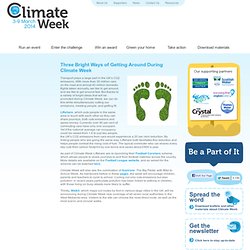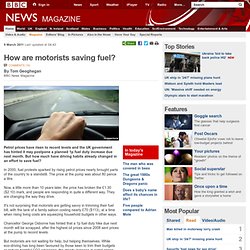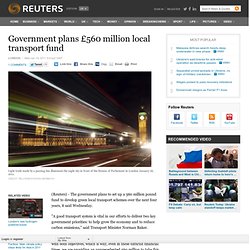

Climate Week » Three Bright Ways of Getting Around During Climate Week. Three Bright Ways of Getting Around During Climate Week Transport plays a large part in the UK’s CO2 emissions.

With more than 30 million cars on the road and almost 40 million domestic flights taken annually, we like to get around, and we like to get around fast. But thanks to a variety of bright ideas that will be promoted during Climate Week, we can do this while simultaneously cutting our emissions, meeting people, and getting fit. Liftshare, which puts people in the same area in touch with each other so they can share journeys, both cuts emissions and saves money. Currently over 90 per cent of commuting cars have only one occupant. As part of Climate Week Liftshare are re-launching their Football Carshare scheme, which allows people to share journeys to and from football matches across the country. Climate Week will also see the culmination of Sustrans‘ The Big Pedal, with Bike to School Week. Soaring petrol prices push commuting costs higher than mortgages.
Campaigners have warned that British consumers are being pushed into a "fuel crisis" as petrol prices soar. Petrol and diesel prices at some pumps rose another 0.5 pence a litre on Monday on top of record prices, prompting protest group Fair Fuel UK to warn that hefty price increases risked sending the UK economy back into recession. Some households, it said, were now paying more on commuting costs than on their mortgage. In recent days forecourt prices have risen steadily and the average price of unleaded petrol is now 130.9p a litre, with diesel averaging 136.38p. However, in many areas of the country motorists have been paying significantly more. Peter Carroll, a Fair Fuel UK spokesman, who delivered a 120,000-signature petition to Downing Street last week, said: "My reaction to these prices is one of horror, of what it will do to the economy, what it will do to people and what it will do to business.
"There is a very real risk that the economy will be pushed into depression. How are motorists saving fuel? 9 March 2011Last updated at 04:43 By Tom Geoghegan BBC News Magazine Petrol prices have risen to record levels and the UK government has hinted it may postpone a planned 1p fuel duty increase due next month.

But how much have driving habits already changed in an effort to save fuel? In 2000, fuel protests sparked by rising petrol prices nearly brought parts of the country to a standstill. The price at the pump was about 80 pence a litre. Now, a little more than 10 years later, the price has broken the £1.30 ($2.10) mark, and people are responding in quite a different way. It's not surprising that motorists are getting savvy in trimming their fuel bill, with the tank of a family saloon costing nearly £70 ($113), at a time when rising living costs are squeezing household budgets in other ways. Chancellor George Osborne has hinted that a 1p fuel duty hike due next month will be scrapped, after the highest oil prices since 2008 sent prices at the pump to record levels.
Maintenance: On the way: Government plans £560 million local transport fund. LONDON Wed Jan 19, 2011 3:41pm GMT LONDON (Reuters) - The government plans to set up a 560 million pound fund to develop green local transport schemes over the next four years, it said Wednesday.

"A good transport system is vital in our efforts to deliver two key government priorities: to help grow the economy and to reduce carbon emissions," said Transport Minister Norman Baker. "Investment in local sustainable transport can deliver quick gains with both objectives, which is why, even in these difficult financial times, we are providing an unprecedented 560 million to take this agenda forward," he added. Transport spending was cut by 15 percent over the next four years in the comprehensive spending review published in October. Baker will set out the government's strategy for local transport in its "Creating Growth, Cutting Carbon" white paper to be presented to parliament Wednesday.
Rising fuel prices have put the issue of car pooling back on the agenda for many cash-strapped commuters.